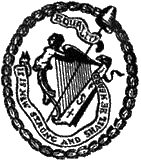
|
THE UNITED IRISHMEN'S PLAN OF PARLIAMENTARY REFORMPublished by the Dublin society of United Irishmen, March 1794 A plan of an equal representation of the people of Ireland in the house of commons Prepared for public consideration by the society of United Irishmen of Dublin I. That the nation, for the purposes of representation solely, should be divided into 300 electorates, formed by combination of parishes, and as nearly as possible equal in point of population. II. That each electorate should return one representative to parliament. III. That each electorate should, for the convenience of carrying on the elections at the same time, be subdivided into a sufficient number of parts. IV. That there should be a returning officer for each electorate, and a deputy returning officer for each subdivision, to be respectively elected. V. That the electors of the electorate should vote, each in the sub- division in which he is registered, and has resided after specified. VI. That the returning officers of the subdivisions should severally return their respective polls to the returning officer of the electorate, who should tot up the whole, and return the person having a majority of votes, as the representative in parliament. VII. That every man possessing the right of suffrage for a representative in parliament, should exercise it in his own person only. VIII. That no person should have a right to vote in more than one electorate at the same election. IX. That every male of sound mind, who has attained the full age of 21 years, and actually dwelt, or maintained a family establishment in any electorate for six months of the twelve immediately previous to the commencement of the election (provided his residence or maintaining a family establishment be duly registered) should be entitled to vote for the representative of the electorate. X. That there should be a registering officer, and a registry of residence in every subdivision of each electorate; and that in all questions concerning residence, the registry should be considered as conclusive evidence. XI. That all elections in the nation should commence and close on the same day. XII. That the votes of all electors should be given by voice and not by ballot. XIII. That no oath of any kind should be taken by any elector. XIV. That the full age of 25 years should be a necessary qualification to entitle any man to be a representative. XV. That residence within the electorate should not, but that residence within the kingdom should be a necessary qualification for a representative. XVI. That no property qualification should be necessary to entitle any man to be a representative. XVII. That any person having a pension, or holding a place in the executive or judicial departments, should be thereby disqualified from being a representative. XVIII. That representatives should receive a reasonable stipend for their services. XIX. That every representative should, on taking his seat, swear that neither he, nor any person to promote his interest, with his privity, gave or was to give any bribe for the suffrage of any voter. XX. That any representative convicted by a jury, of having acted contrary to the substance of the above oath, should for ever be disqualified from sitting or voting in parliament. XXI. That parliaments should be annual. XXII. That a representative should be at liberty to resign his delegation upon giving sufficient notice to his constituents. XXIII. That absence from duty for should vacate the seat of a representative. Society of United Irishmen of Dublin (Dublin 1794). pp. 124-6. Extracted from Edmund Curtis and R B McDowell editors, Irish Historical Documents 1172-1922 Methuen London 1943 pp237-8 |